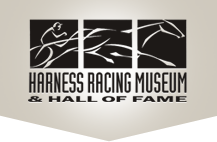
colonel richard west
Colonel Richard West was born on February 26, 1819 in Scott County, Kentucky. He was the fourth of seven children and received a well-rounded education in the local common schools and then at Georgetown College. After graduation he decided to follow in his father’s footsteps by becoming a farmer. In 1851 he married Miss Edmonia Samuel and began a family that would eventually include three children. When his father died in 1853, West was deeded a portion of his 232-acre farm, Edge Hill, located near Georgetown, KY. Aspiring to own the entire farm, West bought the other shares owned by his brothers and sisters and eventually more than doubled its size to 523 acres.
During the Civil War West acquired extensive experience dealing in cattle and mules. By the end of the war he decided to begin breeding trotters. Requiring a strong stallion to head the farm, West set his sights on Immortal R. A. Alexander’s four-year-old stallion Almont (Abdallah – Sally Anderson – Mambrino Chief) despite the high price of $8,000. This decision soon proved to be highly beneficial due to the esteem and wealth that Almont contributed to Edge Hill. By the time West sold Almont seven years later, he had become such a well-respected stallion, with offspring including Piedmont 2:17¼ and Alpine, that General W. T. Withers gladly paid $15,000 for him.
West immediately began looking for a new stallion to replace Almont. While on a trip to New York, he had seen Dictator (Hambletonian 10 – Clara – American Star) trot a quarter mile over a half-mile track in 34 seconds. West was instantly impressed by the horse and talked to Dictator’s owner, Harrison Durkee of New York’s Spring Hill Farm, to discuss leasing him. Durkee was willing to accept West’s offer, but only under the staggering conditions that the stud fee be set at $200 and limited to only thirty mares. At the time this fee was double those of the most famous stallions in Kentucky, including George Wilkes, Mambrino Patchen and Almont. West’s confidence in the horse was unwavering and he agreed to lease Dictator for the next two years. Due to the high stud fee in combination with the fact that Dictator had not produced any foals with a standard record to date, the majority of the mares he covered were owned by West. Dictator returned to New York a seeming failure; however, that opinion quickly changed as the foals from those two seasons matured. They included Phallas 2:13¾, the first trotter to lower Smuggler’s eight year standing record of 2:15¼; Jay-Eye-See 2:10, the first 2:10 trotter; and Director 2:17, a great racehorse of the day and founder of the sire line through Direct 2:05½ – Direct Hal 2:04¼ – Napoleon Direct 1:59¾ – Billy Direct 1:55 – Tar Heel 1:57, which ranks as one of the harness racing world’s greatest speed families. West was vindicated for his early confidence in Dictator, who soon sold for $25,000 and returned to Kentucky as one of the most fashionable sires in America.
Another of West’s breeding successes was Onward 2:25¼, (George Wilkes – Dolly – Mambrino Chief). At the time he was considered to be one of George Wilkes’ best foals; however, he would gain future fame for being the grandsire of the great pacer Single G. 1:58½.
In 1880, due to the national economic turmoil of the late 1870s, West was forced to sell Edge Hill. He moved to Lexington and purchased an estate called Orchard Park. To this new farm he brought Egbert, the leading sire of 1889, and Robert McGregor 2:17½, the sire of Immortal Cresceus 2:02¼. Both of these stallions were standing at the farm when Col. Richard West passed away on May 20, 1887 after a long struggle with heart disease. He was buried at his long-time home, Edge Hill. At the time of his death there were nearly forty horses of his own breeding who had broken the “charmed circle of 2:30 performers.”

